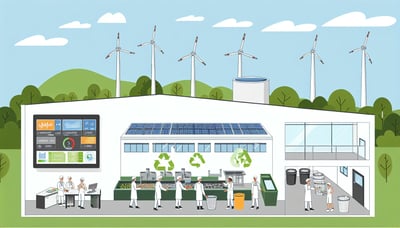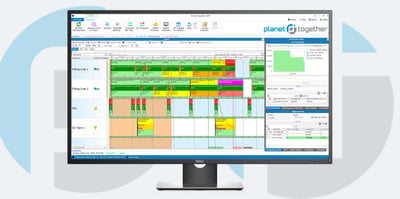Topics: PlanetTogether Software, Integrating PlanetTogether, Streamlined Workflows, Real-Time Insights, Continuous Improvement and Adaptability, Minimize Energy Consumption, Pharmaceutical Manufacturing, Data Harmonization, Reduce Waste Generation
The pursuit of sustainability has emerged as a critical imperative in pharmaceutical manufacturing. With increasing environmental concerns, regulatory pressures, and consumer demands for eco-conscious products, plant managers are tasked with reimagining production scheduling strategies to align with sustainable practices.
In this blog, we look into the significance of sustainable production scheduling and explore how integrating advanced scheduling solutions like PlanetTogether with ERP, SCM, and MES systems can revolutionize the landscape of pharmaceutical manufacturing.

The pharmaceutical industry is under growing scrutiny to minimize its environmental footprint and enhance sustainability across the entire value chain. From reducing energy consumption and waste generation to optimizing resource utilization, sustainable practices are no longer just a moral obligation but a strategic necessity. Plant managers play a pivotal role in driving this transformation by implementing sustainable production scheduling strategies that balance operational efficiency with environmental stewardship.
Traditional production scheduling methods often prioritize cost and throughput without adequate consideration for sustainability metrics. Batch-oriented scheduling, long lead times, and inefficient resource allocation contribute to excessive energy consumption, waste generation, and carbon emissions. Moreover, manual scheduling processes are prone to errors and lack the agility required to adapt to dynamic market demands and regulatory changes.
![]()

Enterprises are increasingly turning to advanced scheduling solutions like PlanetTogether to optimize production schedules while incorporating sustainability criteria. PlanetTogether offers sophisticated algorithms and real-time optimization capabilities that enable plant managers to:
Minimize Energy Consumption: By optimizing production sequences and equipment utilization, PlanetTogether reduces idle time and energy waste, leading to significant cost savings and environmental benefits.
Reduce Waste Generation: By synchronizing production with demand and inventory levels, PlanetTogether minimizes overproduction and inventory obsolescence, thereby reducing waste and enhancing resource efficiency.
Optimize Resource Utilization: Through intelligent scheduling algorithms, PlanetTogether maximizes the utilization of resources such as manpower, equipment, and raw materials, resulting in higher productivity and lower environmental impact.
Enhance Agility and Responsiveness: PlanetTogether's integrated platform enables real-time visibility into production schedules, allowing plant managers to quickly adapt to changing market conditions, regulatory requirements, and supply chain disruptions.

To unleash the full potential of sustainable production scheduling, integration between PlanetTogether and ERP, SCM, and MES systems is paramount. Seamless data exchange between these systems enables holistic decision-making and end-to-end visibility across the manufacturing ecosystem. Whether it's SAP, Oracle, Microsoft, Kinaxis, Aveva, or other leading platforms, integration with PlanetTogether unlocks synergies that drive operational excellence and sustainability.
Data Harmonization: Integration ensures consistency and accuracy of data across different systems, eliminating silos and enabling informed decision-making.
Real-time Insights: By integrating real-time production data with enterprise systems, plant managers gain actionable insights into performance metrics, KPIs, and sustainability indicators.
Streamlined Workflows: Integrated workflows facilitate seamless collaboration and communication between departments, suppliers, and partners, accelerating time-to-market and reducing operational friction.
Continuous Improvement: With integrated systems, plant managers can implement continuous improvement initiatives based on data-driven analytics and predictive modeling, driving ongoing optimization and innovation.
In the pursuit of sustainable production scheduling strategies, pharmaceutical plant managers stand at the forefront of innovation and change. By leveraging advanced scheduling solutions like PlanetTogether and integrating them with ERP, SCM, and MES systems, they can achieve a delicate balance between economic prosperity, environmental responsibility, and social accountability.
As the industry embraces the imperative for sustainability, those who lead the charge will not only reap tangible rewards but also contribute to a healthier, greener, and more resilient future for generations to come.
Are you ready to take your manufacturing operations to the next level? Contact us today to learn more about how PlanetTogether and integrated scheduling solutions can help you achieve your sustainability goals and drive success in the pharmaceutical industry.
Topics: PlanetTogether Software, Integrating PlanetTogether, Streamlined Workflows, Real-Time Insights, Continuous Improvement and Adaptability, Minimize Energy Consumption, Pharmaceutical Manufacturing, Data Harmonization, Reduce Waste Generation
0 Comments
No video selected
Select a video type in the sidebar.







LEAVE A COMMENT